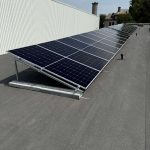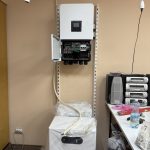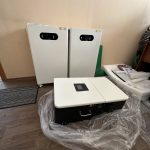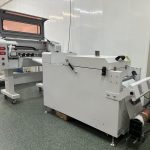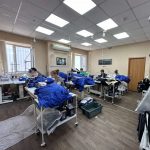
- About BDF
- Programs
- To banks
- For enterprises
- News BDF
- Public information
- Home
- Success stories
- Working at the limit to keep the team together
Working at the limit to keep the team together
How an entrepreneur from Dnipro kept his business going during the war, joined the Armed Forces, and is building his own energy-independent production
Ukrainian small business during a full-scale war has learned to survive on the edge. Between blackouts and generators, staff evacuations and attempts to keep the team, supply chain disruptions and hope for at least one order. Staying afloat in this reality is already heroic. And keeping production running while you go serve in the Armed Forces – is a challenge only a few dare to take on.
Mykola Zhupanenko from Dnipro is one of them. An entrepreneur, founder and head of the company “Promyslovyy Arsenal”, which manufactures corporate and industrial clothing, he now serves as a driver-mechanic in the Armed Forces. And his business – despite all the risks – keeps going.
“I was afraid that if I left, everything would fall apart. But it turned out: if there are reliable people by your side, you can endure anything. Even a war,” says Mykola.
From idea to own production facility
The story of “Promyslovyy Arsenal” began back in 2014. At that time, Mykola already had nearly a decade of experience supplying workwear and clearly understood: customers want not just quality, but a comprehensive approach. To save time and get a finished product without logistical headaches.
That’s how Promyslovyy Arsenal was born: it started with 18 m² and a few people, and today has about 700 m² of production space and a team sewing clothes for major companies from Kyiv, Dnipro, Sumy, and other cities.
“Our clients are business. We’re a one-stop shop: jackets, T-shirts, outerwear, prints, embroidery – we do it all under one roof.”
Mykola is not a tailor or a technician – but he’s an organizer. One of those who installs windows after renovation if there’s no one else. “My goal wasn’t just to earn money but to do better. I wanted to be the first in my profession.”
War, a generator, and 30 liters of gasoline a day
After the full-scale invasion, the business went through several stages. At first – a complete collapse of civilian orders and a shift to almost exclusively military contracts: uniforms, thermal underwear, suits. Later – a return to the civilian market. But the hardest challenge came in winter 2022–23: the blackouts.
“We worked for two months on a generator. Every day 30 liters of gasoline. At 6 a.m. I’d start it to warm up the space a bit. It was tough, but stopping – would’ve been worse. Because losing the team – is losing everything.”
For Mykola, business is not about profit. At least, not during wartime. “You start from break-even – taxes, rent. If you’re at zero – that’s already a win. Starting again would be much harder.”
A grant that became a foundation
Electricity bills reached 30,000 UAH per month. That’s when Mykola’s family began seriously considering energy independence. They already had solar panels at home – and they worked well. Around the same time, he found out about the grant “Support for the Energy Resilience of Micro and Small Enterprises in Ukraine.”
“We applied for the first component of the project and got a positive response! The grant amount was 430,000 UAH. Soon the first tranche arrived – and we bought a solar station, an inverter, and batteries. Everything will be installed very soon.”
According to his estimates, electricity costs will drop 5–6 times. And that’s money that can be reinvested – in salaries, equipment, and development. “For small business, such projects are like oxygen. They show that change is possible. And that I – am not alone.”
On the frontline and in the rear – at once
Since December 3, 2024, Mykola has been serving in the Armed Forces. Driver-mechanic. But in reality, he does much more. Thanks to his background in document management and operations, he also handles paperwork, helps with logistics, and internal communication.
His wife took over operations, production processes – and technology. And, as Mykola admits, business is not just alive, but growing. “When you have reliable people by your side – the business stays alive. And that’s the most important thing,” he says.
This publication was prepared within the support of the international cooperation project “Energy resilience support for micro and small enterprises in Ukraine” under the ReACT4UA Program (Utilization and Implementation of the Association Agreement between the EU and Ukraine in the field of Trade) that is co-funded by the German Government and the Norwegian Agency for Development Cooperation (NORAD). It is implemented by the German federal company “Deutsche Gesellschaft für Internationale Zusammenarbeit (GIZ) GmbH”.
The project aims to increase the resilience of the Ukrainian economy to recurrent power outages and assure business continuity of Micro, Small and Medium Enterprises (MSMEs) by financially supporting solutions for an uniterrupted access to electricity.
The content of this publication is the sole responsibility of the Business Development Fund and does not necessarily reflect the views of the Government of Germany, NORAD, or GIZ.
